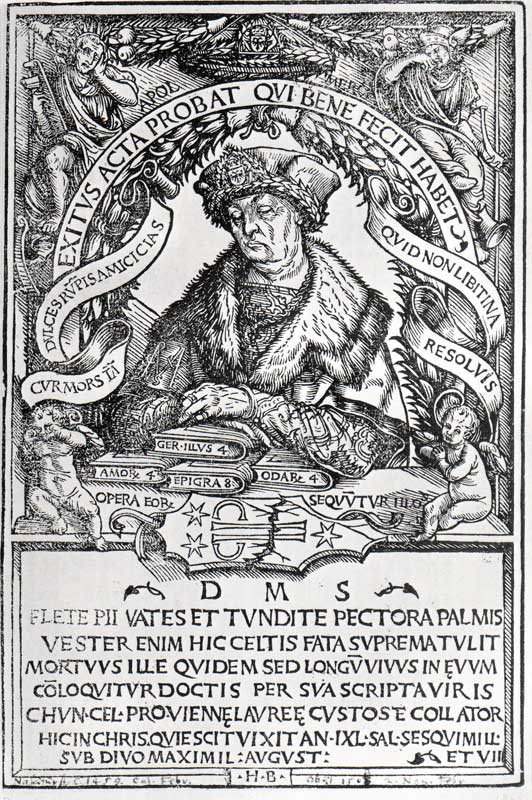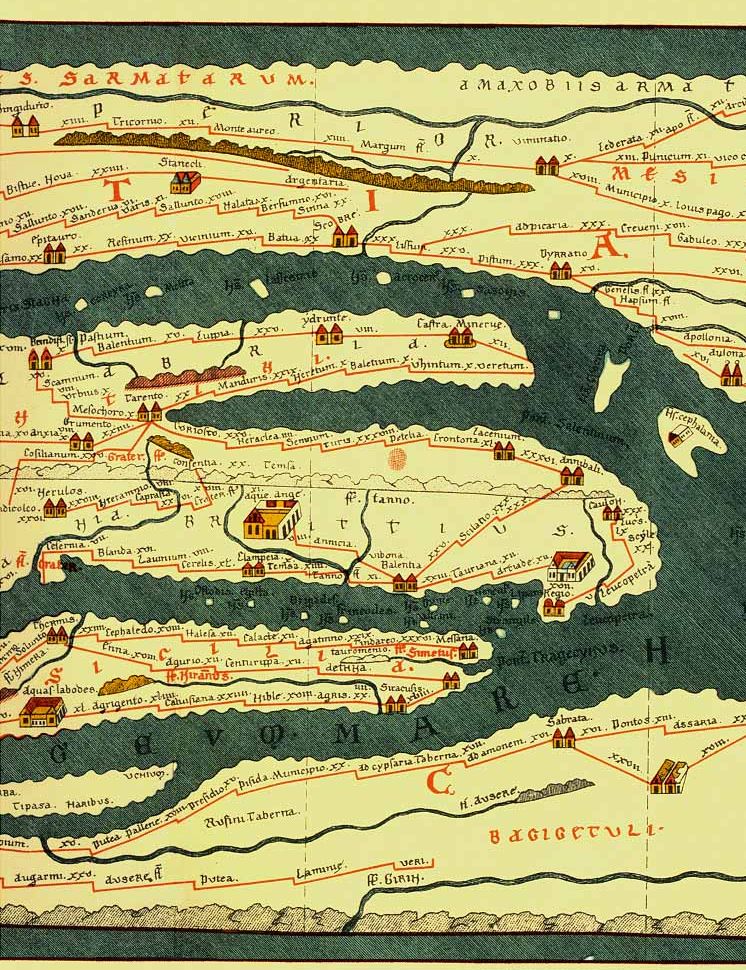
Conrad Celtis (1459-1508)
On April 18, 1487, German Renaissance humanist scholar and Neo-Latin poet Conrad Celtis was claimed “poeta laureatus“, the prince of poets, the first German to receive this honor by emperor Frederic III at the Imperial Diet in Nuremberg. Conrad Celtis‘ teachings had lasting effects, particularly in the field of history, where he was the first to teach the history of the world as a whole. He is also often referred to as Der Erzhumanist (“The Archhumanist”) and stimulated interest in Germany in both classical learning and German antiquities. Probably, if you are a computer scientist, you might never have heard of Conrad Celtis. Actually, he was the namesake of my old high school, the Celtis Gymnasium in Schweinfurt, Germany. Actually, following the custom of renaissance scholars, he changed his original German name “Bickel” or “Pyckell”, the name of the pickaxe of a wine maker, to its Latin version “Celtis“. Funny thing is that one of my high school teachers also had the name “Bickel”. But this is not so uncommon for the region where I’ve grown up and where also Conrad Celtis stems from. Franconia is a wine growing region in northern Bavaria.
Conrad Celtis – Youth and Education
Born at Wipfeld, near Schweinfurt in Lower Franconia under his original name Konrad Bickel as the son of a wine maker, Celtis pursued his studies at Cologne and the University of Heidelberg, where he received instruction from famous humanists Johann von Dalberg and Rodolphus Agricola. For some time he delivered humanist lectures during his travels to Erfurt, Rostock and Leipzig. His first publication was entitled Ars versificandi et carminum (The Art of Writing Verses and Poems, 1486). He further two years in Italian humanist circles and undertook lecture tours to Rome, Florence, Bologna and Venice.
Poet Laureate
In 1487, the elector Frederick of Saxony approached the emperor Frederick III, who named Conrad Celtis Poet Laureate upon his return. The title stems from an antique tradition to crown the best poet with laurel. Famous predecessors of Celtis as poeta Laureata are Francesco Petrarca or Enea Silvio da Piccolomini. At this great imperial ceremonial gathering in Nuremberg, Celtis was at the same time presented with a doctoral degree. Celtis again made a lecturing tour throughout the Holy Roman empire. Later he traveled to Kraków where, in 1488, he applied himself to mathematics, astronomy and the natural sciences and befriended many other humanists such as Lorenz Rabe and Bonacursius. He also founded a learned society, based on the Roman academies. The local branch of the society was called Sodalitas Litterarum Vistulana (the “Literary Society at the Vistula River“).
Nuremberg Chronicle
In 1490 he went through Breslau (Wrocław) to Prague, capital of the Kingdom of Bohemia. Hartmann Schedel used Celtis’ descriptions of Breslau in the Schedelsche Weltchronik (Nuremberg Chronicle).[5] In 1491, Celtis became professor of poetry and rhetoric at the University of Ingolstadt. There, in 1492 he delivered his famous speech to the students there, in which he called on Germans to rival Italians in learning and letters. This would later become an extremely popular address in sixteenth-century German nationalistic sentiment. While the plague ravaged Ingolstadt, Celtis taught at Heidelberg.
A Centre of Humanistic Studies
In 1497 emperor Maximilian I appointed him professor at Vienna University, where Celtis founded, on Italian models, a centre for humanistic studies, the Sodalitas Danubiana. In Vienna he lectured on the works of classical writers and in 1502 founded the Collegium Poetarum, a college for poets. Conrad Celtis died at Vienna a few years later of syphilis.

Tabula Peutingeriana – Antique Map of the Roman Empire
Rediscovery of Hroswitha of Gandersheim
Celtis rediscovered the manuscripts of Germany’s first woman poet, the 10th-century nun Hroswitha of Gandersheim,[4] and also the so-called Peutinger Table, a antique road map of the Roman Empire, showing the Roman cursus publicus. The map was discovered in a library in Worms by Celtis, who was unable to publish his find before his death and bequeathed the map in 1508 to Konrad Peutinger, a German 15–16th-century humanist and antiquarian, after whom it is named. The original map upon which it is based probably dates to the 4th or 5th century and was itself based on a map prepared by Agrippa during the reign of the emperor Augustus.
Teaching History
Conrad Celtis’ teachings had lasting effects, particularly in the field of history. He was the first to teach the history of the world as a whole. He collected numerous Greek and Latin manuscripts in his function as librarian of the imperial library that was founded by Maximilian. The dominant theme of patriotism that partly inspired these editions is an important element in Celtis’ works. Among his scholarly works were editions of Tacitus’ Germania (1500), Hrosvitha’s plays (1501), and the 12th-century poem on Barbarossa, Ligurinus (1507). His greatest work, however, is his lyric poetry: Odes (published posthumously, 1513), Epigrams (in manuscript until 1881), and especially Amores (1502), love poems of forthright sensuality and true lyrical intensity.[2]
Book Talk Webinar: CARTOGRAPHIC HUMANISM: THE MAKING OF EARLY MODERN EUROPE, [11]
References and Further Reading:
- [1] Biography of Konrad Celtis, at Biography.us
- [2] Konrad Celtis at Britannica Online
- [3] Eberhard Weber: Der gekrönte Conrad Celtis und das Fichtelgebirge, at bayern-fichtelgebirge.de
- [4] Hrotsvitha of Gandersheim and the Medieval Drama, SciHi Blog
- [5] The Nuremberg Chronicle and the History of the World, SciHi Blog
- [6] Conrad Celtis at Wikidata
- [7] Conrad Celtis at Reasonator
- [8] The Arch-Humanist, at The Renaissance Mathematicus
- [9] “Conrad Celtes”, Allgemeine Deutsche Biographie (ADB) (in German), 4, Leipzig: Duncker & Humblot, 1876, pp. 82–88
- [10] Conrad Celtes at the Mathematics Genealogy Project
- [11] Book Talk Webinar: CARTOGRAPHIC HUMANISM: THE MAKING OF EARLY MODERN EUROPE, Katharina Piechocki (Harvard University, Comparative Literature), UCLAInternational @ youtube
- [12] Timeline of German Renaissance Humanists, via DBpedia and Wikidata






Your blog post makes absolutely no mention of the historically very important contributions that Celtis made to the promotion of the mathematical sciences in the early sixteenth century. For example he went and studied mathematics at the University of Cracow because none of the German universities offered the discipline. Later he took both of the mathematicians Andreas Stiborius and Johannes Stabius from Ingolstadt to Vienna to further his aims in cartography etc. His college in Vienna was not a Collegium poetarum but a Collegium poetarum et mathematicorum with two lecturers for each discipline. This formed the basis for the Second Viennese School of Mathematics, which played a significant role in the history of European mathematics
Thanks for complementing our post on Conrad Celtis! We really appreciate your valuable and well-founded comments whenever it comes to the history of mathematics.
Best regards,
Harald